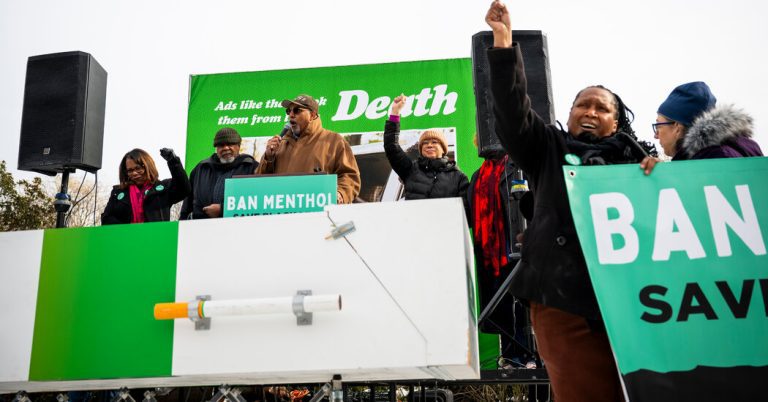Nearly a quarter of menthol smokers quit a year or two after the menthol ban went into effect, according to a study published Wednesday.
The researchers found that about half of the menthol smokers switched cigarettes, and another quarter managed to continue smoking menthol. The rate of menthol smokers who quit was higher in countries that imposed bans, as opposed to cities or states, because it was harder for people to drive a few miles to continue buying menthol cigarettes, the study found.
The Food and Drug Administration is urging the Biden administration to ban menthol cigarettes, a goal that has drawn strong opposition from retailers and tobacco companies along with concerns in a presidential election year that it could alienate black voters.
Black smokers, who prefer menthol cigarettes, would also gain the most from such a ban, public health researchers say, noting that premature deaths from cancer, heart and lung disease could be avoided after smoking rates drop sharply.
The study analyzed the effects of bans in other countries, including Canada and some in the European Union, as well as bans in place in states including Massachusetts. The researchers looked at studies, smoking rates and cigarette sales as part of their analysis.
“Our review found that banning menthol would have a pro-equity impact, which means we expect smoking to decrease more among black smokers compared to other racial or ethnic groups,” said Sarah Mills, lead author of the study. of study and assistant professor at the University of North Carolina School of Public Health.
What remains to be seen is whether the White House, perhaps haunted by the anti-regulatory backlash against public health measures taken during the coronavirus pandemic, will push through the ban this year. In December, the White House delayed making a decision on the proposal until at least March, raising speculation that it would fade as President Biden seeks a second term.
Menthol cigarettes generate billions of dollars in sales each year for opponents of the ban, including Reynolds American, maker of Newport cigarettes. Altria, maker of menthol Marlboros. and gas stations and convenience stores.
Opponents have mounted a campaign about the potential consequences of a ban, sponsoring ads that threaten a wave of illegal cigarette smuggling across the US-Mexico border. They have also raised the profile of those predicting a possible increase in police violence against Black Menthol cigarette smokers. But the proposed US ban does not target individuals. manufacturer-level enforcement is proposed.
Public health experts have stepped up their pressure in recent weeks, holding a “menthol funeral” outside the White House to draw attention to the annual toll of 480,000 smoking-related deaths. Former surgeons general called on the White House earlier this month to “save lives” by immediately finalizing the ban and “not to be distracted by the tobacco industry and its apologists.”
And the Campaign for Tobacco-Free Kids released its own poll Thursday that suggested the ban would not reduce black voter support for the president. The survey, conducted for the advocacy group, found that 62 percent of respondents said they were in favor of banning menthol, compared to 25 percent who disapproved.
“This new data proves what we already know to be true — black voters want to see a menthol ban,” said Derrick Johnson, president of the NAACP, in a statement.
In the new study, the researchers noted that cigarette companies had raised concerns about the illegal trafficking of menthol as an argument against the ban. However, the study showed that Canada did not experience an increase in seizures of illegal cigarettes after the nationwide ban. It remains unclear whether a US ban would have a similar effect.
In a 2021 study that used a model to assess the effects of banning menthol, David Levy, a professor of oncology at Georgetown University, found that it could lead to an overall reduction in smoking of about 15 percent. By 2060, the study found, up to 11 million more years of life could be gained than lost to smoking-related deaths.
“These effects are delayed,” Dr. Levy said, “but still significant.”
Ruth Igielnik contributed reporting.




